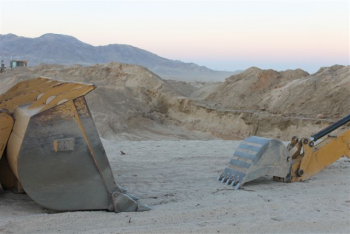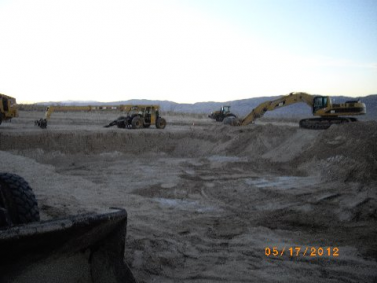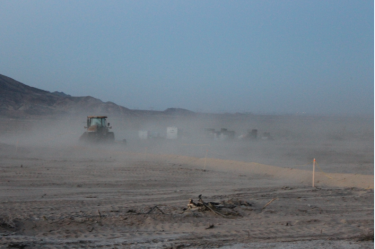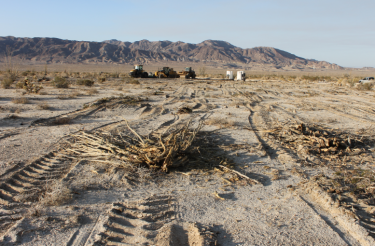By Miriam Raftery
 May 23, 2012 (San Diego)—Dashing hopes of tribal members hoping to halt destruction of the desert and desecration of the ancestor’s graves, United States District Judge William Q. Hayes has denied a temporary restraining order sought by the Quechan Indians to halt the Ocotillo Express wind project.
May 23, 2012 (San Diego)—Dashing hopes of tribal members hoping to halt destruction of the desert and desecration of the ancestor’s graves, United States District Judge William Q. Hayes has denied a temporary restraining order sought by the Quechan Indians to halt the Ocotillo Express wind project.
During a hearing Friday in San Diego, Quechan’s attorney told Judge Hayes that applicant Pattern Energy effectively argued that for a renewable energy project to comply with the National Environmental Policy Act (NEPA), all that’s required is to study the impact—not to take action to address impacts found by the study “no matter what it shows, even if not one living thing would survive on the land.”
The Environmental Impacts Study showed significant impacts to cultural and biological resources on the land, owned by the federal Bureau of Land Management and designed as class L, for low-impact usages.
 “Are there ANY limits that apply to development of renewable energy on class L lands?” the tribe’s attorney asked.
“Are there ANY limits that apply to development of renewable energy on class L lands?” the tribe’s attorney asked.
Quechan contends the project will cause irreparable harm to hundreds of sites including burial and cremation sites, as well as tens of thousands of artifacts. Forensic dog teams hired by tribes last week found six new cremation sites. Tribal members, who in modern times have continued to use the site for ceremonial purposes, also sought to protect views of mountains sacred in their religious beliefs of creation.
Arguing for the government, a BLM lawyer brazenly argued that “scenic value is not protected” on any class-L lands. BLM contended that irreparable harm would not occur and that the new discoveries would be protected and assessed.
Quechan’s attorney retorted, “They’re out there with bulldozers and graders.” He said there is a high likelihood of more subsurface discoveries—but only if the bulldozers are stopped before everything not yet discovered is destroyed.
 He also raised serious questions on the merits of the projects. Both sides predict that they will prevail when the merits of the case are heard.
He also raised serious questions on the merits of the projects. Both sides predict that they will prevail when the merits of the case are heard.
“What they want to do is build the project while this case is being litigated,” Quechan’s lawyer argued, adding that Pattern would likely claim it is “inequitable” to ask it to tear down the wind facility once built. The tribe has won a land use case in the past on similar grounds, he said, arguing that the BLM failed to consult with the tribe. “They were certainly on notice.” The BLM contends that the tribe was notified but did not participate in consultations.
Other tribes including Viejas have said they were consulted, but that those consultations were “meaningless” as concerns were largely not addressed.
Quechan’s attorney also argued for a public interest in protecting the land and natural resources. “They want to build renewable energy projects wherever they want.”
 BLM’s attorney contended that there is a “strong national priority to build renewable resources on public lands” and argued that “multiple use land can be a power plant or electrical generation.” The attorney noted that the Ocotillo site already has two high-voltage power lines and is designated as an “energy corridor.” The government’s lawyer insisted it is “not a pristine desert,” contradicting numerous statements to the contrary made by environmental organizations in recent media reports, including the Desert Protective Council.
BLM’s attorney contended that there is a “strong national priority to build renewable resources on public lands” and argued that “multiple use land can be a power plant or electrical generation.” The attorney noted that the Ocotillo site already has two high-voltage power lines and is designated as an “energy corridor.” The government’s lawyer insisted it is “not a pristine desert,” contradicting numerous statements to the contrary made by environmental organizations in recent media reports, including the Desert Protective Council.
Patterns’ lawyer informed the Judge that subsidies for wind energy expire at year’s end. “If we miss the deadline, we lose $130 million.”
The attorney for Quechan concluded by addressing the court. “If a temporary restraining order is not issued, if we are successful [on the merits] we will be asking you to remove the turbines.”
Denying the temporary restraining order without prejudice, the Judge concluded that the plaintiff failed to “show that the balance of hardships tips sharply in its favor.” Judge Hayes ordered parties to contact the Magistrate Judge immediately to confer on an expedited motion for preliminary injunction or an expedited motion for summary judgment.
To Native American tribal members and others anguished over the destruction of the desert and desecration of ancestral graves, the decision came as a painful blow.
Meanwhile, construction continues in Ocotillo at a rapid pace even as area residents assert and have documented numerous apparent violations of air and water quality laws, wildlife protections and devastation more expansive than indicated in the final project approval documents.







Comments
A lawyer for the Wind Industry or for the people?
A lawyer that represents BLM is the same as a lawyer working for the wind industry. In other words the BLM is clearly demonstrating a bias in the process. Yet this seemingly democratic statement is posted on the BLM Web site...............To ensure the best balance of uses and resource protections for America’s public lands, the BLM undertakes extensive land use planning through a collaborative approach with local, state and tribal governments, the public, and stakeholder groups. In reality the "balance of uses" are settled in a back room with the stakeholders sitting at the head of the table, directing the BLM how to sell it.
Not surprising, but
Not surprising, but heartbreaking nonetheless. The judge was, I suppose, a last ditch hope. It never should have come to that.
We should be able to trust agencies like the BLM with with responsible stewardship of public lands--especially in sensitive wilderness areas like the desert around Ocotillo. But time and again they have proven that they have about as much care for the land as pimps have for women's rights.
Forget about legislators, judges and politicians; outraged and outspoken citizens are the only thing that can stop the ongoing prostitution of our precious wilderness.